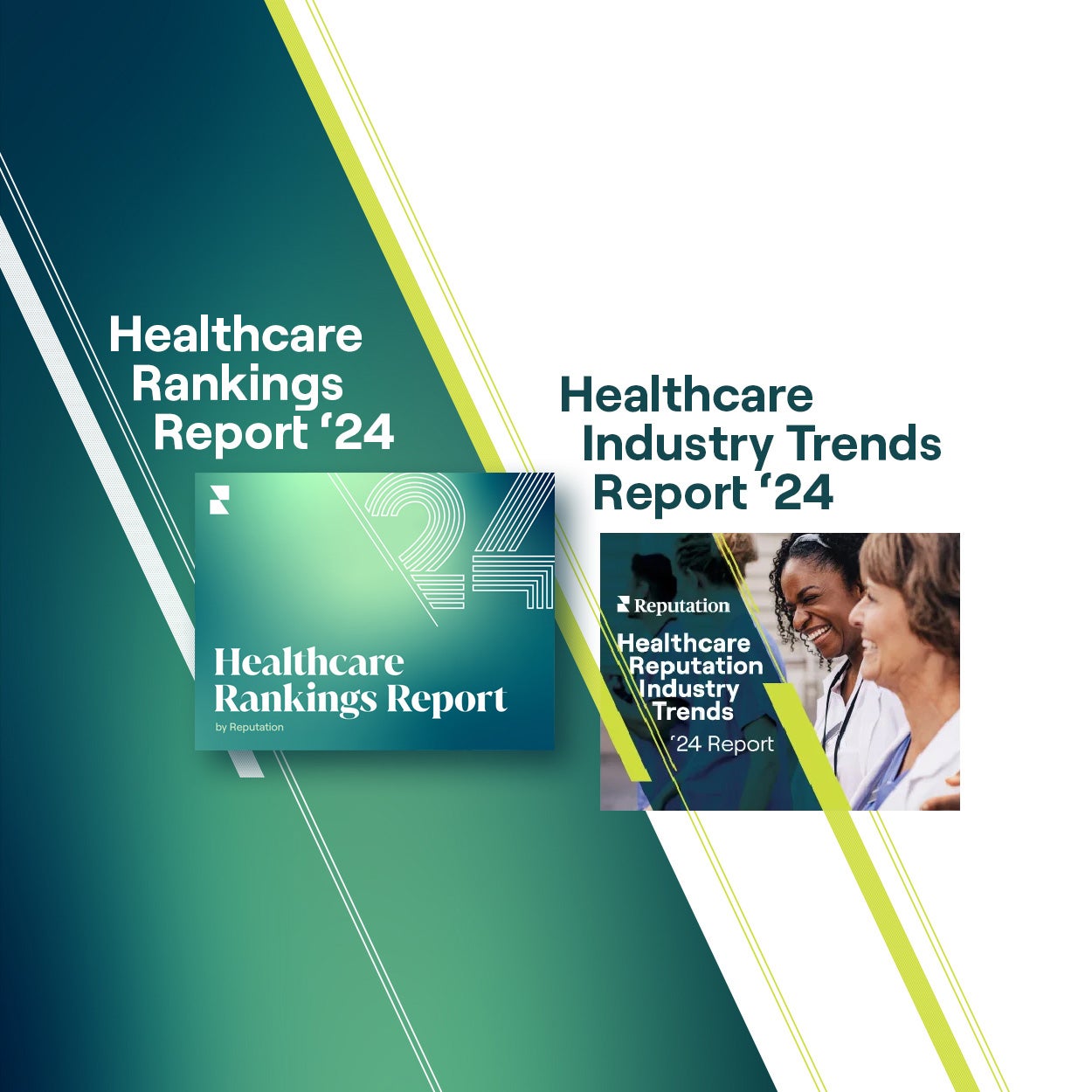Healthcare Reputation Report – 2019 Q4 update
Reputation Staff Writer

Executive Summary
In an era where so many organizations thrive — or don’t — because of how they are perceived online, it’s more important than ever to manage customer experience across the customer journey. Nowhere is this more critical than in healthcare environments, where the customer — the patient — is often physically vulnerable and where emotions run high. Arguably, this sets a higher standard for the healthcare customer’s experience than, say, a retail or hospitality customer’s experience.
Because of this — and because today’s healthcare customers find providers online and rely on information in online reviews and social media to inform their decisions — maintaining a stellar online reputation is essential. Health systems and providers that neglect their online reputation will struggle to compete with others that proactively and consistently manage their reputation and subsequently show up higher in search rankings with more positive reviews.
In order to stay relevant and win in this increasingly competitive landscape, healthcare organizations need to optimize every element of their digital strategy. Getting found online, being chosen for care, and improving patient experience based on customer feedback are critical elements of this strategy, all of which can be effectively monitored and measured using reputation management methodologies.
Most importantly, data in the report shows a direct correlation between online reputation and financial performance.
Specifically, this report covers:
- The relationship between online ratings and revenue per bed
- Trends in patient reviews and comments
- Ratings for the Top 100 hospitals based on customer experience
Armed with this information, health systems are better positioned to manage and address their online reputations, analyze patient feedback to improve operations and processes, and increase revenue per bed.
Reputation.com applied artificial intelligence, machine learning and sentiment analysis to unstructured text in reviews of 4,800 hospitals that report revenue annually to the Centers for Medicare and Medicaid Services (CMS). From that sample, we included 3,824 hospitals with 10 or more online reviews on Google or Facebook between January 1, 2016 and August 31, 2018. Hospital ratings are not available on Healthgrades.
We tiered Reputation Score as low, medium and high: Low comprises the bottom 25 percent, medium comprises the middle 50 percent and high comprises the top 25 percent.
Measured on a scale of one to 1,000, Reputation Score is a comprehensive index of a company’s digital presence and in-person patient experience. It is calculated based on factors that include overall review sentiment, volume, recency, spread across review sites, social media sentiment, business listings accuracy and other factors that unambiguously reflect consumers’ opinions about their patient experience, online and onsite. Reputation Score is the most comprehensive measure of a hospital’s, clinic’s or healthcare provider’s reputation with consumers.
The Nine Components of Reputation Score
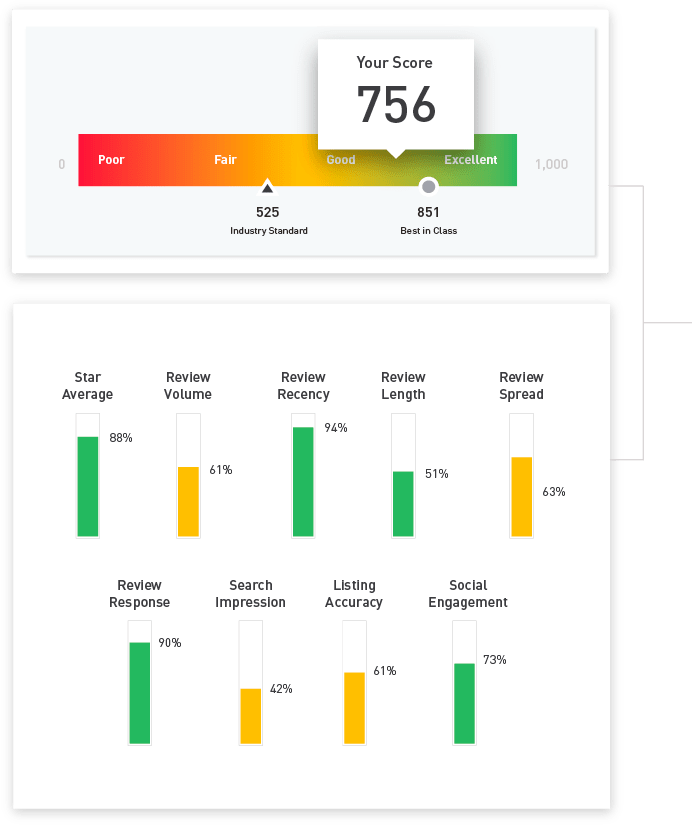
Healthcare facilities must look into their overall Reputation Score to ensure they’re paying attention to all the factors that comprise it.
Direct Relationship Between Reputation Score and Revenue
A Strong Online Reputation = Higher Revenue
Specifically, hospitals with a Reputation Score in the top 25 percent have a revenue per bed that is $1.2 million higher than hospitals with a Reputation Score in the bottom 25 percent.
Relationship between Reputation Score and Revenue
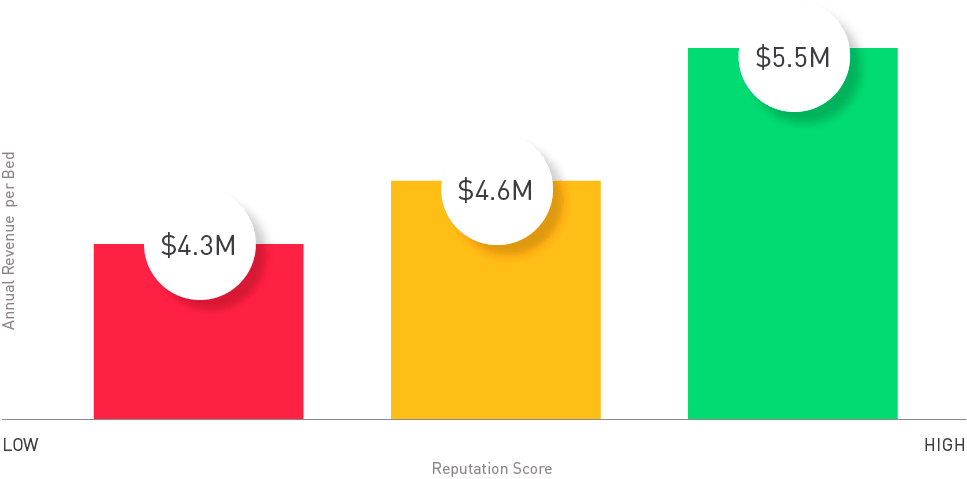
Key Findings
The following tables show leading hospitals ranked by Reputation Score. Highlights include:
- Duncan Regional Hospital, Inc. has the highest average Reputation Score
- Patient experience begins before anyone walks in the door. Consumers want a good experience, from awareness to the final bill
- Use of the top five review sites continues to grow (Google, Home pages, Apple, Facebook, Bing)
- Hospital reviews on Google grew an incredible 86% from 2016 to 2018 — establishing it as the preferred platform for leaving hospital reviews.
- “Staff” shows up as the main category in both the leader and laggard hospitals, underscoring the importance of understanding the sentiment and trends in the reviews
The Top 10 Hospitals in the United States
Here are the leading hospitals in the U.S. by Reputation Score — those most trusted by consumers to deliver a great overall customer experience.
| Rank | Provider Name | City | State | Score |
| 1 | Duncan Regional Hospital, Inc. | Duncan | OK | 834 |
| 2 | Houston Physicians’ Hospital | Webster | TX | 809 |
| 3 | Lakeview Regional Medical Center | Covington | LA | 809 |
| 4 | Sunnyview Hospital and Rehabilitation Center | Schenectady | NY | 793 |
| 5 | Women’s and Children’s Hospital | Lafayette | LA | 792 |
| 6 | Rapides Regional Medical Center | Alexandria | LA | 781 |
| 7 | Shriners Hospitals for Children – Cincinnati | Cincinnati | OH | 777 |
| 8 | Huhu Kam Memorial Hospital | Sacaton | AZ | 771 |
| 9 | Fairway Medical Center | Covington | LA | 765 |
| 10 | Medical Center South Arkansas | El Dorado | AR | 761 |
| 10 | Shriners Hospitals for Children | Greenville | SC | 761 |
The Top 10 Hospitals in the United States
| Rank | Provider Name | City | State | Score |
| 1 | Duncan Regional Hospital, Inc. | Duncan | OK | 834 |
| 2 | Houston Physicians’ Hospital | Webster | TX | 809 |
| 3 | Lakeview Regional Medical Center | Covington | LA | 809 |
| 4 | Sunnyview Hospital and Rehabilitation Center | Schenectady | NY | 793 |
| 5 | Women’s and Children’s Hospital | Lafayette | LA | 792 |
| 6 | Rapides Regional Medical Center | Alexandria | LA | 781 |
| 7 | Shriners Hospitals for Children – Cincinnati | Cincinnati | OH | 777 |
| 8 | Huhu Kam Memorial Hospital | Sacaton | AZ | 771 |
| 9 | Fairway Medical Center | Covington | LA | 765 |
| 10 | Medical Center South Arkansas | El Dorado | AR | 761 |
| 10 | Shriners Hospitals for Children | Greenville | SC | 761 |
| 12 | Holy Cross Hospital | Fort Lauderdale | FL | 760 |
| 13 | White Memorial Medical Center | Los Angeles | CA | 759 |
| 13 | St Jude Children’s Research Hospital | Memphis | TN | 759 |
| 13 | Menorah Medical Center | Overland Park | KS | 759 |
| 16 | Treasure Valley Hospital | Boise | ID | 755 |
| 16 | Lee’s Summit Medical Center | Lees Summit | MO | 755 |
| 18 | East Tennessee Children’s Hospital | Knoxville | TN | 751 |
| 19 | Tulane Medical Center | New Orleans | LA | 747 |
| 20 | Kapiolani Medical Center for Women & Children | Honolulu | HI | 746 |
| 21 | Driscoll Children’s Hospital | Corpus Christi | TX | 745 |
| 22 | Mountain View Hospital | Idaho Falls | ID | 744 |
| 23 | Shriners Hospitals for Children | Houston | TX | 743 |
| 23 | Oakbend Medical Center | Richmond | TX | 743 |
| 25 | LDS Hospital | Salt Lake City | UT | 741 |
| 25 | Research Medical Center | Kansas City | MO | 741 |
| 25 | Presbyterian St Luke’s Medical Center | Denver | CO | 741 |
| 28 | Watertown Regional Medical Center | Watertown | WI | 740 |
| 29 | Coral Gables Hospital | Coral Gables | FL | 738 |
| 29 | Belton Regional Medical Center | Belton | MO | 738 |
| 31 | Douglas County Hospital | Alexandria | MN | 736 |
| 32 | Boston Children’s Hospital | Boston | MA | 734 |
| 33 | Covenant Children’s Hospital | Lubbock | TX | 732 |
| 34 | Wesley Medical Center | Wichita | KS | 724 |
| 35 | Yuma Regional Medical Center | Yuma | AZ | 721 |
| 36 | Connecticut Children’s Medical Center | Hartford | CT | 718 |
| 37 | The Heart Hospital Baylor Plano | Plano | TX | 715 |
| 37 | Keck Hospital of Usc | Los Angeles | CA | 715 |
| 39 | Hancock Regional Hospital | Greenfield | IN | 714 |
| 40 | Rainbow Babies and Children’s Hospital | Cleveland | OH | 712 |
| 41 | Cypress Pointe Surgical Hospital | Hammond | LA | 709 |
| 42 | Centrastate Medical Center | Freehold | NJ | 707 |
| 43 | Tristar Southern Hills Medical Center | Nashville | TN | 706 |
| 44 | Butler County Health Care Center | David City | NE | 705 |
| 45 | Willis Knighton Medical Center | Shreveport | LA | 699 |
| 46 | Garden Park Medical Center | Gulfport | MS | 698 |
| 47 | Cullman Regional Medical Center | Cullman | AL | 695 |
| 48 | Iowa Methodist Medical Center | Des Moines | IA | 694 |
| 49 | Scripps Green Hospital | La Jolla | CA | 689 |
| 50 | Baptist Medical Center Jacksonville | Jacksonville | FL | 685 |
| 50 | Baylor Medical Center At Uptown | Dallas | TX | 685 |
| 52 | Reston Hospital Center | Reston | VA | 684 |
| 52 | Rose Medical Center | Denver | CO | 684 |
| 52 | Valley Children’s Hospital | Madera | CA | 684 |
| 55 | Alfred I Dupont Hospital for Children | Wilmington | DE | 682 |
| 56 | Simi Valley Hospital & Health Care Services | Simi Valley | CA | 679 |
| 57 | St Louis Children’s Hospital | Saint Louis | MO | 678 |
| 58 | Arkansas Children’s Hospital | Little Rock | AR | 677 |
| 58 | Raulerson Hospital | Okeechobee | FL | 677 |
| 60 | Seattle Children’s Hospital | Seattle | WA | 676 |
| 60 | St Lucie Medical Center | Port Saint Lucie | FL | 676 |
| 60 | Ohsu Hospital and Clinics | Portland | OR | 676 |
| 60 | Children’s Mercy Hospital Kansas | Overland Park | KS | 676 |
| 64 | Beth Israel Deaconess Medical Center | Boston | MA | 674 |
| 65 | Harborview Medical Center | Seattle | WA | 671 |
| 65 | Children’s Hospital of Philadelphia | Philadelphia | PA | 671 |
| 67 | Plantation General Hospital | Plantation | FL | 669 |
| 68 | The Woman’s Hospital of Texas | Houston | TX | 668 |
| 69 | Parkview Regional Medical Center | Fort Wayne | IN | 666 |
| 70 | Nemours Children’s Hospital | Orlando | FL | 664 |
| 71 | Dayton Children’s Hospital | Dayton | OH | 663 |
| 71 | Nicklaus Children’s Hospital | Miami | FL | 663 |
| 73 | Verde Valley Medical Center | Cottonwood | AZ | 661 |
| 73 | The Woods at Parkside | Columbus | OH | 661 |
| 73 | Optim Medical Center – Tattnall | Reidsville | GA | 661 |
| 76 | Cook Children’s Medical Center | Fort Worth | TX | 659 |
| 77 | Centerpoint Medical Center | Independence | MO | 658 |
| 78 | Lone Peak Hospital | Draper | UT | 656 |
| 78 | Massachusetts General Hospital | Boston | MA | 656 |
| 78 | Swedish Medical Center | Englewood | CO | 656 |
| 81 | Ronald Reagan UCLA Medical Center | Los Angeles | CA | 652 |
| 82 | South Miami Hospital | South Miami | FL | 651 |
| 82 | Pampa Regional Medical Center | Pampa | TX | 651 |
| 84 | Jersey Shore University Medical Center | Neptune | NJ | 650 |
| 85 | Aventura Hospital and Medical Center | Aventura | FL | 649 |
| 85 | Auxilio Mutuo Hospital | Hato Rey | PR | 649 |
| 85 | Mayo Clinic Hospital | Phoenix | AZ | 649 |
| 88 | Medical Center of Plano | Plano | TX | 647 |
| 89 | Sacred Heart Hospital on the Emerald Coast | Miramar Beach | FL | 645 |
| 90 | Saint Thomas Midtown Hospital | Nashville | TN | 644 |
| 91 | Timpanogos Regional Hospital | Orem | UT | 640 |
| 91 | Brigham and Women’s Hospital | Boston | MA | 640 |
| 93 | Tristar Centennial Medical Center | Nashville | TN | 639 |
| 93 | Palm Beach Gardens Medical Center | Palm Beach Gardens | FL | 639 |
| 95 | St Mark’s Hospital | Salt Lake City | UT | 638 |
| 96 | Monterey Park Hospital | Monterey Park | CA | 637 |
| 97 | Kaiser Foundation Hospital – Roseville | Roseville | CA | 636 |
| 98 | St Bernards Medical Center | Jonesboro | AR | 631 |
| 98 | Kingman Regional Medical Center | Kingman | AZ | 631 |
| 100 | University of North Carolina Hospital | Chapel Hill | NC | 630 |
Trends That Shape Your Reputation
Patient Experience Begins Before Anyone Walks in the Door
Consumers want a good experience, from awareness to the final bill. How a patient finds a provider online is a key part of the patient journey that should not be under-emphasized. A consumer’s ability to easily find and assess a provider online is the beginning of a great patient experience.
Google is dominating the search landscape in healthcare. It is the top vehicle used for the healthcare listings that consumers use to find organizations and providers. After Google, there are four other sources consumers turn to for healthcare listings: hospital and health system websites, Apple, Facebook, and Bing. Along with Google, these sites comprise 89 percent of all searches for healthcare providers.
It’s worth noting that healthcare specialty sites are becoming less and less of a source of information and stopping point for consumers looking for a provider.
Listing Sites That Matter Most

SOURCE
Reputation.com data, 2018. Analysis covers various types of search methods for listings information, including maps, desktop and mobile searches, searches for address, phone number, and a range of other criteria.
Use of the Top Five Sites Continues to Grow
Google, Home pages, Apple, Facebook, Bing

Not only are patients looking for information for healthcare services and providers on Google, but they are also using Google to leave reviews.
Tier 2 Sites Now Make Up Only 10% of the Sites Visited When Patients Look for Healthcare Listings
Healthgrades, WebMD, Yahoo and Vitals
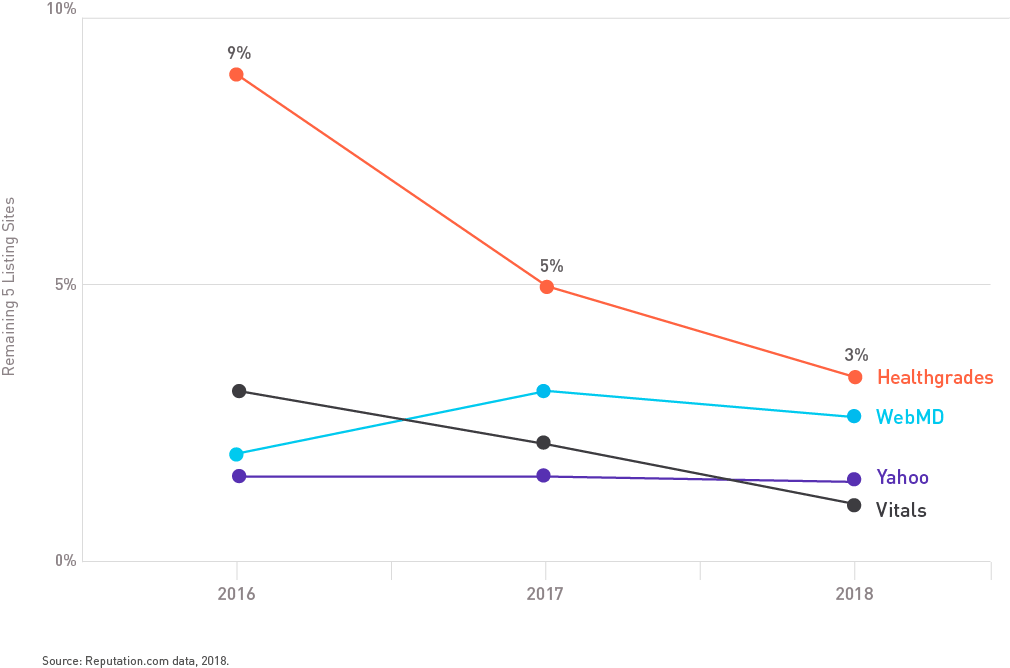
Hospital Reviews on Google 2016 to 2018
Hospital reviews on Google grew an incredible 86% from 2016 to 2018 — establishing it as the preferred platform for leaving hospital reviews.

While not all reviews are negative (patients do heap praise for particularly good experiences), the number of negative comments — centering mostly on billing issues, wait times and outcomes — hovers consistently around 40 percent. This is significantly higher than other industries. For example, our research on apartment management firms shows negative reviews hover at around 14 percent.
Recurring Keywords in Online Reviews Show Where Hospitals Excel, Fall Short
Online reviews yield a wealth of insight into what hospitals and healthcare systems are doing well and where they must improve. For example, positive online reviews seem to be heavily influenced by the kindness of healthcare workers and the level of information exchange between patients and their doctors and staff. Comments about highly rated hospitals are focused on compassion and communication.
Customer Feedback: Leaders and Laggards
Leading Hospitals
Positive focus on staff, bedside manner and surgery center

Digging into the reviews of the top 100 hospitals, our analysis found that they performed better in three main categories — “staff”, “bedside manner”, and “surgery center.” Within those categories, we were able to identify shared topics that helped explain how these hospitals were driving higher sentiment in the categories. In the “staff” category, “care love,” “great staff” and “good hands” were the most relevant topics appearing in these hospitals’ positive reviews. In the “bedside manner” category, “friendly staff”, “caring doctor” and “provide explanation” were most relevant. And in the “surgery center” category, “pre-surgery,” “hip/knee replacement” and “pain control” were the most relevant topics.
Lagging Hospitals
Negative focus on staff, wait time and emergency
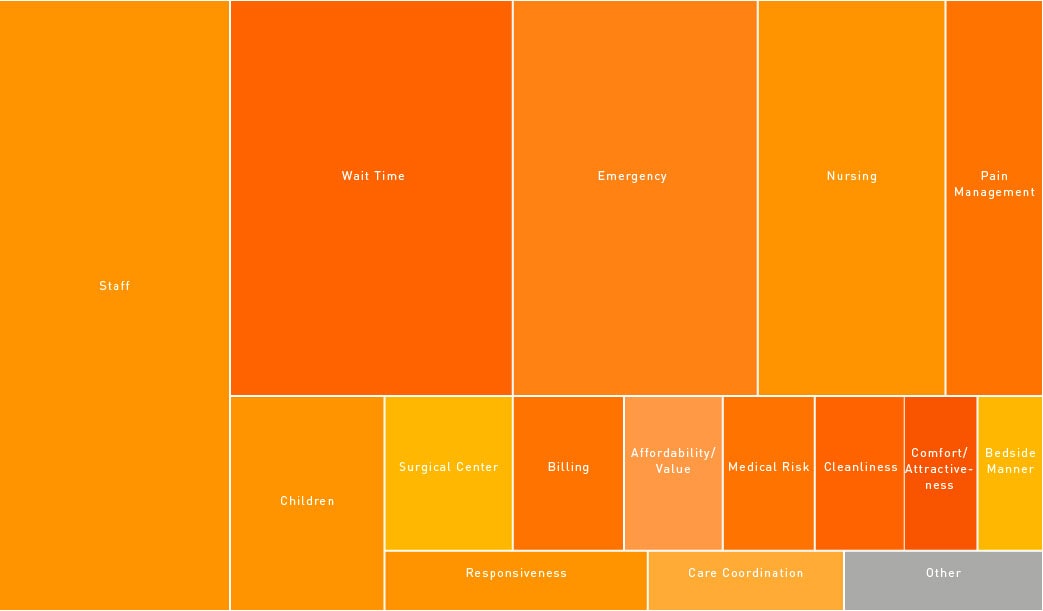
Conversely, our analysis of online sentiment of hospitals on the bottom of the list showed three categories in which improvements must be made: “staff”, “wait time”, and “emergency.” Topics that consistently bubbled up in “staff” included “rude nurse”, “discharge” and “asked to leave.” In the “wait time” category, the main topics that emerged were “wait on staff”, “just leave”, “rude nurse.” In the “emergency” category, the most relevant topics were ”pain”, “ inexperienced team” and “waiting.”
“Staff” shows up as the main category
“Staff” shows up as the main category in both the leader and laggard hospitals, underscoring the importance of understanding the sentiment and trends in the reviews. By routinely analyzing online sentiment in positive and negative reviews, hospitals and systems can identify differentiators and problem areas and use that information to improve their Reputation Score.
Maintaining a Healthy Online Reputation
Final Thoughts
Patient experience is a predictor of success for hospitals and healthcare providers. With the prolific use of social media and online review sites, the patient journey starts at the first search for a provider and continues through to post-care when patients leave reviews. It’s critical that healthcare organizations develop and pursue reputation management strategies to improve patient experience.
The following are three best practices for those focused on achieving a better online reputation:
Maintain your Reputation Score.
Research reveals that 88 percent of healthcare consumers begin their search for a provider online. What they find there determines which hospital and doctors they choose. Remember that Reputation Score is determined by every touchpoint a patient has with a health system — from location and provider listings, to star ratings, to doctor profiles on a website. Your Reputation Score supports the management of each touchpoint effectively, and tracks success along the way.
Focus on Google.
Patient experience starts when a patient looks for a doctor or hospital online, and Google is the number one place being used to find healthcare information. Combine that with the huge increase in online reviews on Google and you see how important a focus on Google is to a healthcare organization’s digital strategy.
Long wait times or problems with billing are especially frustrating for patients, but have nothing to do with clinical quality or patient care. Issues like these can frequently be fixed by making operational adjustments, and will have a huge impact on patient experience — if you know about them in time. Real-time alerts to negative reviews gives you the power to resolve a situation and give patients the experience they want. Power exists not just in understanding challenges, but also in being alerted to challenges in real time so that they can be resolved quickly.

